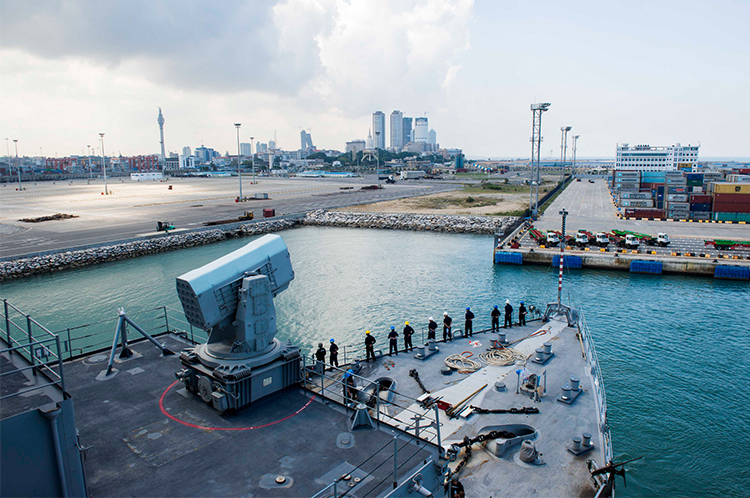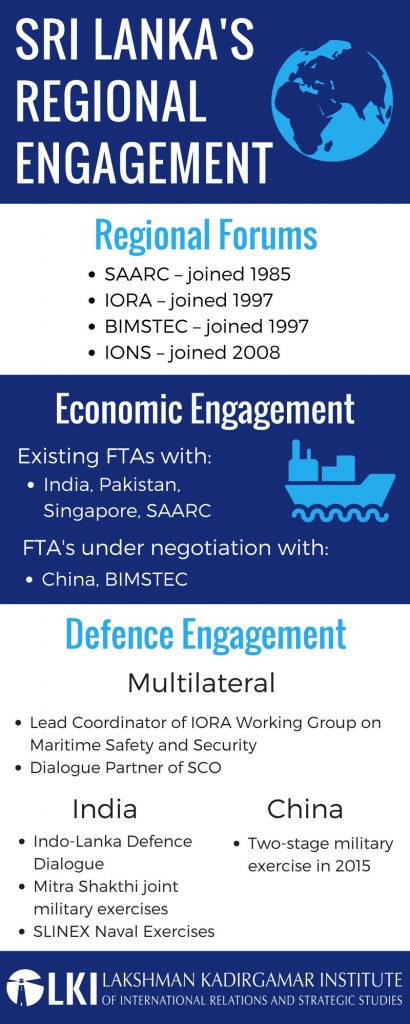July 26, 2018 Reading Time: 5 minutes
 Reading Time: 5 min read
Reading Time: 5 min readImage Credit: Naval Surface Warriors / flickr
Barana Waidyatilake*
Sri Lanka’s strategic location at the centre of the Indian Ocean region has, over the centuries, attracted the attention of various great powers emerging in or venturing into the region. In the present day, the rising powers of India and China are seeking to shape the region to advance their strategic interests, with Sri Lanka once again being caught up in a ‘great game.’This article seeks to outline what Sri Lanka, as a smaller state in the Indian Ocean region, can do to ensure its security against this context of growing geopolitical competition.
There is general agreement in the academic discourse that smaller states thrive best under a strong rules-based order.1 States like the Netherlands2 were initial supporters of the idea of the Law of the Sea, seeking to uphold freedom of trade and navigation. Later, in the post-colonial era, smaller states like Singapore3 explicitly stated that upholding rules-based order (based on the principles of the UN Charter) was the way to ensure their wellbeing and security.However, norms are powerless without accompanying harder power – both military and economic – to enforce them. While smaller states benefit from a rules-based order, they are unable to shoulder the costs of enforcement themselves and must necessarily partner with larger powers in doing so.The Indian Ocean region at present is a good example of a situation where normative frameworks such as the UN Convention on the Law of the Sea (UNCLOS) nominally apply, but without any accompanying enforcement capacity. The relative decline of US power against an increasingly assertive China has meant that the US is seeking to pass some responsibility4 of maintaining security in the Indian Ocean to regional partners. However, most of these partners, such as India, Thailand, and Australia, still lack the military and economic clout to act as a security guarantor for the region. These developments threaten the stability of the Indian Ocean, with growing competition between the rising powers of China and India.
What can Sri Lanka then, as a smaller Indian Ocean state, do in this context? In short, it should engage with a multiplicity of actors to secure a regional rules-based order in its interests. Such rules-based order should set clear normative guidelines as to how countries in the Indian Ocean should conduct themselves in the maritime domain, including in accessing ports and other maritime infrastructure.Of course, this begs the question of how Sri Lanka can effectively engage with a multiplicity of actors in the current context. In this regard, there has been much speculation that Sri Lanka’s growing economic ties with China would implicitly align it with China’s strategic agenda. It can be argued, however, that Sri Lanka’s economic relationship with China obscures many aspects of Sri Lanka’s multi-pronged engagement with other powers and smaller states in the region.For example, Sri Lanka has long engaged with various regional organisations, being one of the founding members of the South Asian Association for Regional Cooperation (SAARC) in 1985, the Indian Ocean Rim Association (IORA) in 1997, the Bay of Bengal Initiative for Multi-Sectoral Technical and Economic Cooperation (BIMSTEC) the same year, and the Indian Ocean Naval Symposium (IONS) in 2008.In addition, with the current government’s attempts to reposition Sri Lanka as the ‘centre of the Indian Ocean,’5 an understanding emerged that Sri Lanka’s engagement with regional states required strengthening through greater economic integration. With these goals in mind, the Sri Lankan government recently signed6 a Free Trade Agreement (FTA) with Singapore, and is also pursuing FTAs with China, India, and multilaterally with BIMSTEC. Sri Lanka is also considering FTAs with other regional countries such as Thailand and Bangladesh.With regard to regional security engagement, Sri Lanka has sought an active role in IORA, being appointed Lead Coordinator7 of its Working Group on Maritime Safety and Security. At the same time, Sri Lanka has also linked with other regional security forums such as the Shanghai Cooperation Organisation (SCO), in which it is a Dialogue Partner. Besides multilateral security engagement, Sri Lanka has also enhanced bilateral defence cooperation with India and China. With India, Sri Lanka has several forms of defence cooperation, including the annual Indo-Lanka Defence Dialogue8 since 2012, the annual Mitra Shakthi joint military exercises9 since 2012, and four rounds of the SLINEX naval exercises10 since 2005. With China, Sri Lanka concluded a two-stage military exercise11 in 2015.These facts should make it quite clear that Sri Lanka has actively pursued a strategy of multilateralism in its quest to ensure its security as a smaller Indian Ocean state. Such multi-actor engagement has not sought to be at the expense of one state or another, particularly India against China.
It is also necessary to consider which actors and regional groupings might best serve as enforcement mechanisms for Sri Lanka’s vision of a rules-based regional order.The emerging quadrilateral security dialogue between India, Australia, the US, and Japan (known informally as the Quad),12 is a likely group of great and middle powers in the region that could perhaps fulfil this role. However, the Quad itself is still at a very early stage13 of development. In this context, Sri Lanka should observe the evolution of this grouping and perhaps consider seeking a lower level of membership that doesn’t ignore the principle of non-alignment, such as observer status.14Sri Lanka can also consider other regional forums where it can advocate for rules-based order. Two key multilateral forums in which Sri Lanka can make this case are IORA and IONS. In the meantime, Sri Lanka is proceeding with its own initiative of discussing a normative statement on the Indian Ocean. All these platforms would provide Sri Lanka an opportunity to advocate for a regional rules-based order.
As geopolitical competition, especially between China and India, intensifies in the Indian Ocean region, Sri Lanka’s best strategy to ensure its own security is to make a clear stand for rules-based order. However, recognising its inherent limitations as a smaller state, Sri Lanka must pursue a proactive strategy of multi-actor engagement to realise this goal, and is arguably already doing so.The Indian Ocean at present is an ocean of uncertainty. While this challenges smaller and centrally located states like Sri Lanka, this should not prevent them from thinking proactively about regional security and developing their own responses to regional issues.
1Yong, J.A. (2016). Small states need rules-based order like the UN, Singapore’s Foreign Minister Vivian Balakrishnan tells world leaders. Straits Times.
2Grotius, H. (2014). Free Sea. Indianapolis: Liberty Fund Inc.
3Rajaratnam, S. (1965). Statement made at the General Assembly. http://www.nas.gov.sg/archivesonline/data/pdfdoc/PressR19650921.pdf
4Hughes, L. (2016). The United States and the Indian Ocean Region: The Security Vector. [online] Future Directions International. Available at: http://www.futuredirections.org.au/publication/united-states-indian-ocean-region-security-vector/
5Lanka Business Online. (2017). Sri Lanka’s PM addresses Indian Ocean Conference 2017. [online] Available at: http://www.lankabusinessonline.com/sri-lankas-pm-addresses-indian-ocean-conference-2017/.
6Hundlani, D. and Wignaraja, G. (2018). Sri Lanka – Singapore FTA: A New Dawn? [online] The Lakshman Kadirgamar Institute. Available at: https://lki.lk/publication/sri-lanka-singapore-fta-a-new-dawn/.
7Daily FT. (2017). Foreign Minister Marapana attends IORA Council of Ministers’ Meeting. [online] Available at: http://www.ft.lk/news/Foreign-Minister-Marapana-attends-IORA-Council-of-Ministers–Meeting/56-642099.
8Defence.lk. (2018). Annual Indo-Lanka Defence Dialogue held in India. [online] Available at: http://www.defence.lk/new.asp?fname=Annual_Indo_Lanka_Defence_Dialogue_held_in_India_20180114_01.
9Sri Lanka Army. (2017). ‘Exercise-Mitra Shakti – 2017’ Draws to a Close. [online] Available at: http://www.army.lk/news/%E2%80%98exercise-mitra-shakti-2017%E2%80%99-draws-close
10Defence.lk. (2017). Sri Lankan Navy ships leave for SLINEX 2017 in India. [online] Available at: http://www.defence.lk/new.asp?fname=Sri_Lankan_Navy_ships_leave_for_SLINEX_2017_in_India_20170905_01.
11Fernando, S. (2017). Joint China-Sri Lanka Army ‘Exercise – Silk Route’ comes to an end. [online] News.lk. Available at: https://www.news.lk/news/item/8664-joint-china-sri-lanka-army-exercise-silk-route-comes-to-a-end.
12Huang, C. (2017). Is Quad the first step towards an Asian Nato? [online] South China Morning Post. Available at: http://www.scmp.com/week-asia/opinion/article/2121474/us-japan-india-australia-quad-first-step-asian-nato.
13Haidar, S. (2017). Quad confusion. [online] The Hindu. Available at: http://www.thehindu.com/opinion/op-ed/quad-confusion/article20723202.ece.
14See remarks of D. Panditaratne. Lakshman Kadirgamar Institute. (2018). LKI hosts Foreign Policy Round Table with Konrad Adenauer School for Young Politicians. Lakshman Kadirgamar Institute [online]. Available at:https://lki.lk/events/lki-on-sri-lankas-economic-agenda-and-quest-for-security-in-the-region/
*Barana Waidyatilake is a Research Fellow at the Lakshman Kadirgamar Institute of International Relations and Strategic Studies (LKI) in Colombo. The author wishes to thank Adm. Dr. Jayanath Colombage for his input. This article was originally published on The Diplomat on 19 July 2018. All errors and omissions remain the author’s. The opinions expressed in this article are the author’s own and not the institutional views of LKI, and do not necessarily reflect the position of any other institution or individual with which the author is affiliated.